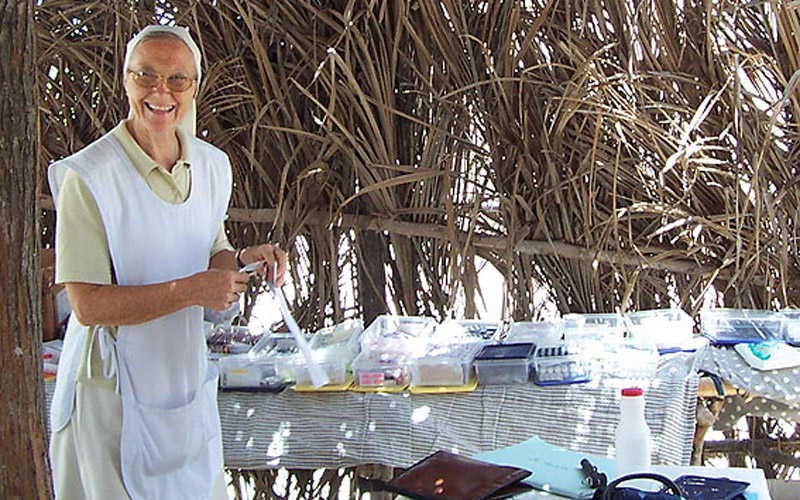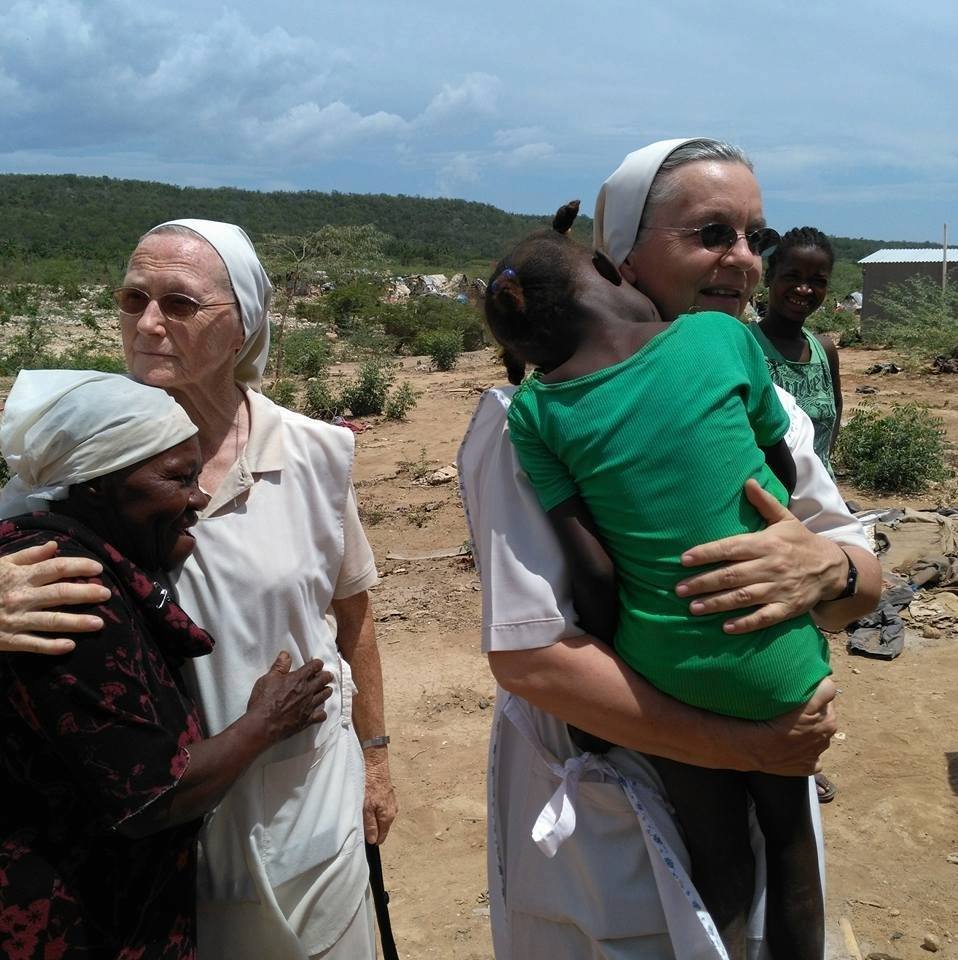A few days ago, the web page: www.periodicolaperla.com published news about the work of the Vincentians in Port-au-Prince… work that helps the elderly and children in Haiti, a place where poverty abounds and where the Sisters receive the eternal gratitude of people who love them.
In the area of La Plaine, just outside Port-au-Prince, five Daughters of Charity, two Spaniards, one Haitian, and one person from Poland minister at a medical dispensary and a day center for the elderly.
In this neighborhood, like so many others in the Haitian capital, most houses do not have electricity or running water, the streets are not paved, and there are mountains of garbage everywhere. The breakfast and the food that the Sisters provide in the day center are the only food that some of the neighbors receive.
“In Haiti, people really go hungry,” says Natalia Martínez de Pablo, from Valencia (España), who at 72 and with an “incredible good health” is the eldest of the Sisters in this country. She arrived 27 years ago, after having ministered living in Switzerland and Thailand.
“At least here they eat and get a little food for the night, because they have nothing. They are people who are totally abandoned,” she cries.
To illustrate the miserable living conditions in which half of the 10 million Haitians live and whose situation has worsened in recent weeks due to political and social tension over the violent demonstrations against the Government, the Sister says that a lady told her that she was so hungry that she ate all the pills that had been prescribed to calm her stomach.
Haiti has been the scene of violent protests since February 7, the second anniversary of the arrival of Jovenel Moise as President. He was inaugurated in the midst of a severe economic crisis, which has become more severe as a result of the sharp depreciation of the gourde, (the official currency), and a galloping inflation.
In recent weeks, “people have been unable to eat because they cannot go out and sell what little they have,” explains Mónica de Juan, a Sister from Madrid who is responsible for the mission “La Milagrosa”, where the day center is located and where 50 elderly people (some with psychiatric problems) are cared for on a daily basis. There is also a medical clinic there and 5 doctors serve about 300 people each day.
Although these centers did not close their doors, the people stayed at home because of the barricades, looting, and violent demonstrations, which have caused at least 9 deaths.
The Sisters affirm that they are not afraid, although they remember that a few years ago the center was assaulted and several of the Sisters were beaten.
“They respect us. They know that in religious communities, especially communities of women, we are here for them. If we have something, it is for them,” says Sister Mónica, who has been in Haiti for 8 years.
Every 15 days, the religious, who also attend to medical emergencies on weekends, visit the sick in their homes.
One of them is Ernst, 46 years old and a volunteer at the day center, who, last November, fell and broke his femur in two places.
It was 15 days until Ernst had surgery (road blocks and demonstrations were only one problem)… another problem arose when the hospital to which he was transferred did not have the supplies for the surgery.
Now Ernst is recovering and leaves his tiny house from time to time; he is able to move around the dusty streets of his neighborhood with the help of a walker.
In recent days, the country has returned to a relatively normal situation, and this Saturday, at the gates of the center of the Daughters of Charity, there were several vendors selling fruit, vegetables and meat.
One of the vendors is André. Two months ago Sister Mónica had to stitch his hand after he cut himself with the machete which he uses to cut the chicken that he sells at his market stall.
Like all the market vendors, André greets the Sisters affectionately and does not hesitate to state that the only help he and so many other people receive is that which is provided by the “Daughters of Charity and God.”
As they walk through the streets of this area, they encounter some of their neighbors carrying water that they obtained from public wells, and they pause to rejoice with a couple of children who proudly show the Sisters their new toys (two cars that they themselves built with plastic bottles).
Despite the serious situation that this country is experiencing, Sister Natalia laments that “Haiti never appears in the news… yes, when there are serious catastrophes like the 2010 earthquake and when people die… then for a brief period of time there is a “a lot of noise, but then, silence once again.”
For Sister Mónica, the problem in Haiti is that it “receives assistance at some specific moments” but there is no on-going assistance that enables the country to move forward.”
Without losing their smiles, the Sisters remember that they were the first, before the NGOs arrived, to help the sick during the cholera epidemic which broke out in 2010 and claimed more than 9,000 lives.
“Despite all the difficulties, it is a blessing to be able to be here,” says Sister Mónica, while Sister Natalia says “I would not change places with anyone.”
“The gratitude of the people, who see our little help as very useful, that gratitude provides us with much satisfaction,” concludes Sister Mónica Jiménez.
Source: https://www.periodicolaperla.com/el-silencioso-trabajo-de-las-misioneras-en-haiti/








Great work of God sustains only by love of God and the poor Ride on sisters for heaven is your limit
Sr Bibiana Emenaha dc Nigeria